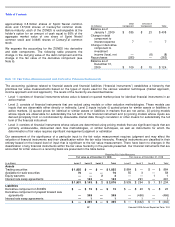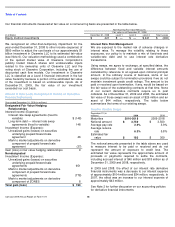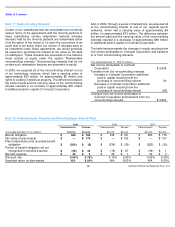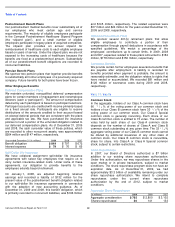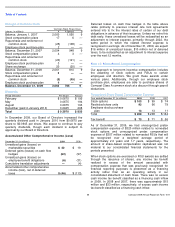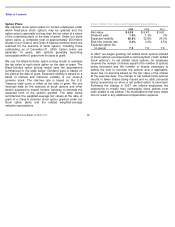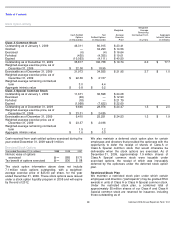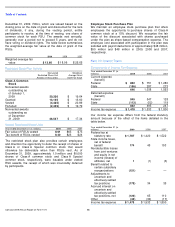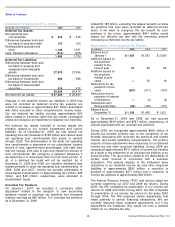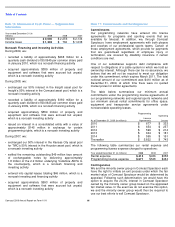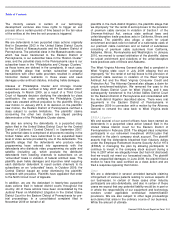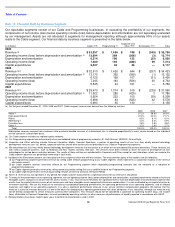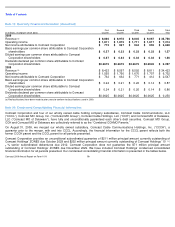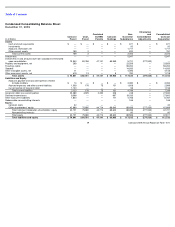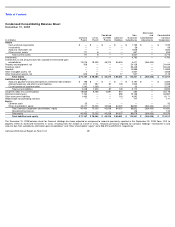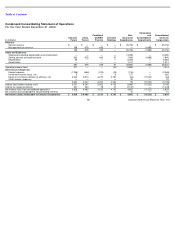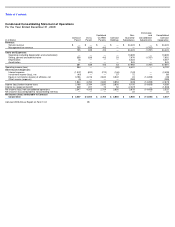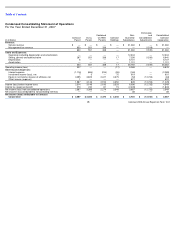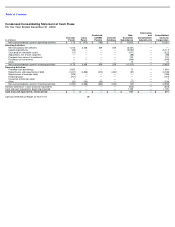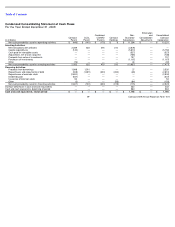Comcast 2009 Annual Report Download - page 76
Download and view the complete annual report
Please find page 76 of the 2009 Comcast annual report below. You can navigate through the pages in the report by either clicking on the pages listed below, or by using the keyword search tool below to find specific information within the annual report.
Table of Contents
67
Comcast 2009 Annual Report on Form 10-
K
The minority owners in certain of our technology
development ventures also have rights to trigger an exit
process after a certain period of time based on the fair value
of the entities at the time the exit process is triggered.
Antitrust Cases
We are defendants in two purported class actions originally
filed in December 2003 in the United States District Courts
for the District of Massachusetts and the Eastern District of
Pennsylvania. The potential class in the Massachusetts case,
which has been transferred to the Eastern District of
Pennsylvania, is our subscriber base in the “Boston Cluster”
area, and the potential class in the Pennsylvania case is our
subscriber base in the “Philadelphia and Chicago Clusters,”
as those terms are defined in the complaints. In each case,
the plaintiffs allege that certain subscriber exchange
transactions with other cable providers resulted in unlawful
horizontal market restraints in those areas and seek
damages under antitrust statutes, including treble damages.
Classes of Philadelphia Cluster and Chicago Cluster
subscribers were certified in May 2007 and October 2007,
respectively. In March 2009, as a result of a Third Circuit
Court of Appeals decision clarifying the standards for class
certification, the order certifying the Philadelphia Cluster
class was vacated without prejudice to the plaintiffs filing a
new motion. In January 2010, in its decision on the plaintiffs’
new motion, the Eastern District of Pennsylvania certified a
class subject to certain limitations. The plaintiffs’ claims
concerning the other two clusters are stayed pending
determination of the Philadelphia Cluster claims.
We also are among the defendants in a purported class
action filed in the United States District Court for the Central
District of California (“Central District”) in September 2007.
The potential class is comprised of all persons residing in the
United States who have subscribed to an expanded basic
level of video service provided by one of the defendants. The
plaintiffs allege that the defendants who produce video
programming have entered into agreements with the
defendants who distribute video programming via cable and
satellite (including us), which preclude the distributor
defendants from reselling channels to subscribers on an
“unbundled” basis in violation of federal antitrust laws. The
plaintiffs seek treble damages and injunctive relief requiring
each distributor defendant to resell certain channels to its
subscribers on an “unbundled” basis. In October 2009, the
Central District issued an order dismissing the plaintiffs’
complaint with prejudice. Plaintiffs have appealed that order
to the Ninth Circuit Court of Appeals.
In addition, we are the defendant in twenty-two purported
class actions filed in federal district courts throughout the
country. All of these actions have been consolidated by the
Judicial Panel on Multidistrict Litigation in the United States
District Court for the Eastern District of Pennsylvania for pre-
trial proceedings. In a consolidated complaint filed in
November 2009 on behalf of all
plaintiffs in the multi-district litigation, the plaintiffs allege that
we improperly
“tie” the rental of set-top boxes to the provision
of premium cable services in violation of Section 1 of the
Sherman Antitrust Act, various state antitrust laws and
unfair/deceptive trade practices acts in California, Illinois and
Alabama. The plaintiffs also allege a claim for unjust
enrichment and seek relief on behalf of a nationwide class of
our premium cable customers and on behalf of subclasses
consisting of premium cable customers from California,
Alabama, Illinois, Pennsylvania and Washington. In January
2010, we moved to compel arbitration of the plaintiffs’ claims
for unjust enrichment and violations of the unfair/deceptive
trade practices acts of Illinois and Alabama.
The West Virginia Attorney General also filed a complaint in
West Virginia state court in July 2009 alleging that we
improperly “tie” the rental of set-top boxes to the provision of
premium cable services in violation of the West Virginia
Antitrust Act and the West Virginia Consumer Credit and
Protection Act. The Attorney General also alleges a claim for
unjust enrichment/restitution. We removed the case to the
United States District Court for West Virginia, and it was
subsequently transferred to the United States District Court
for the Eastern District of Pennsylvania and consolidated with
the multi-district litigation described above. There were oral
arguments in the Eastern District of Pennsylvania in
December 2009 in connection with a motion by the Attorney
General to remand the case back to West Virginia state
court.
ERISA Litigation
We and several of our current officers have been named as
defendants in a purported class action lawsuit filed in the
United States District Court for the Eastern District of
Pennsylvania in February 2008. The alleged class comprises
participants in our retirement investment (401(k)) plan that
invested in the plan’s company stock account. The plaintiff
asserts that the defendants breached their fiduciary duties
under the Employee Retirement Income Security Act of 1974
(ERISA) in managing the plan by allowing participants to
continue to invest in the company stock account during a
time in 2007 when we allegedly knew (but had not disclosed)
that we would not meet our forecasted results. The plaintiff
seeks unspecified damages. In June 2009, the plaintiff filed a
motion to have the case certified as a class action and we
filed a response opposing that motion.
Other
We are a defendant in several unrelated lawsuits claiming
infringement of various patents relating to various aspects of
our businesses. In certain of these cases other industry
participants are also defendants, and also in certain of these
cases we expect that any potential liability would be in part or
in whole the responsibility of our equipment and technology
vendors under applicable contractual indemnification
provisions. We are also subject to other legal proceedings
and claims that arise in the ordinary course of our business.
While the amount of ultimate


